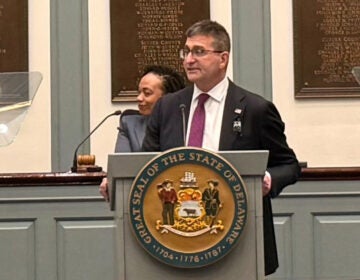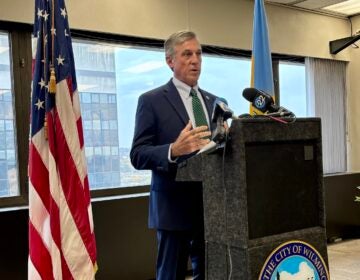Delaware Gov. John Carney wants criminal justice reform to focus on use-of-force
Delaware Gov. John Carney talked about efforts to implement police reforms in Delaware as part of an hourlong radio interview produced by WHYY and Delaware Public Media.
Listen 59:02
File photo: Delaware Gov. John Carney. (AP Photo/Evan Vucci)
In the first edition of Ask Governor Carney, a live radio show produced Monday afternoon by WHYY and Delaware Public Media, Delaware Governor John Carney talked about legislative efforts to reform the way Delaware’s police interact with the public.
He also reaffirmed his steadfast opposition to legalizing marijuana and praised Delawareans for their efforts to combat COVID-19.
Stream the full show with the ‘listen’ button above.
Below are some of the biggest takeaways from Monday afternoon’s conversation.
Criminal justice reform efforts
Following the death of George Floyd at the hands of Minneapolis police a year ago, activists in Delaware have joined a chorus from around the country calling for criminal justice reform. While the state formed a task force to address those concerns last year, those activists — including some on the task force — have been unhappy with the slow progress.
They’ve advocated for changes to Delaware’s Law Enforcement Officers’ Bill of Rights (LEOBOR), which grants broad protections to officers and keeps many details of investigations into officer misconduct hidden from public view.
Carney said he’s less concerned about changing LEOBOR, saying reforms like body cameras, civilian review boards, and changes to rules about how officers interact with suspects could be more impactful.
“Most importantly is the rules as it relates to the use of force, it’s those rules of engagement, when to use force to control a suspect is what it boils down to I think,” he said.
Lawmakers are expected to push legislation that would amend the officer’s bill of rights and strengthen the restrictions on use of deadly force before the end of their legislative session in June.
Legislative priorities include gun bills, but not marijuana
Carney expressed his support for a pair of gun bills making their way through the General Assembly. One measure would require training and a permit for anyone buying a handgun. The other bans high-capacity magazines.
“I do support them, yes, we’ll see whether there is enough support in the legislature,” he said. “I don’t want anybody to lose focus on the real problem in our state, which is handgun violence, street gun, handgun violence in the city of Wilmington and Dover and Seaford and other communities across the state.”
Carney remains steadfastly opposed to legalizing marijuana.
Even as New Jersey has made it legal and Pennsylvania governor Tom Wolf is pushing for legalization in the Keystone state, Carney is not in favor.
“We spent all this time and money to get people to stop smoking cigarettes, and now we want to say it’s okay to just smoke marijuana recreationally. Look, I don’t want to sound like a prude about it. I just don’t think it’s a good idea,” he said.
Spending surplus revenue
Since introducing his budget in January, the Delaware Economic and Financial Advisory Council, which sets Delaware’s estimated revenue for lawmakers, has added $750 million for lawmakers to allocate in the FY22 budget which starts July 1.
Carney’s method for dealing with the big jump in revenue is to use it for one-time items that won’t carry over into years when revenue declines.
“We’re in another year with higher levels of revenue than expected, mostly one-time in nature. So we should use them for one-time projects,” he said.
Among the one-time projects on Carney’s wish list is a new courthouse for Kent County, which could cost in the neighborhood of $200 million. He’d also like to fund a new school on Wilmington’s East side, which could cost $50 – $100 million. Other projects include water and wastewater infrastructure improvements throughout the state.
Lawmakers have until the end of June to approve a new budget.
Coming out of COVID-19 restrictions
Carney praised both residents and state workers for their efforts to combat the COVID-19 pandemic. Even as the state’s restrictions have mostly been lifted, Carney still urged residents to get vaccinated.
“It’s getting to the point where people can see the light at the end of the tunnel,” he said. “My bottom-line message is get vaccinated and then you don’t have to worry about it. We’re now around 60% overall, and we’d like to get to 70%. We are going to come forward this week with some incentives to try to get folks there a little bit hesitant over the goal line.”

Get daily updates from WHYY News!
WHYY is your source for fact-based, in-depth journalism and information. As a nonprofit organization, we rely on financial support from readers like you. Please give today.





